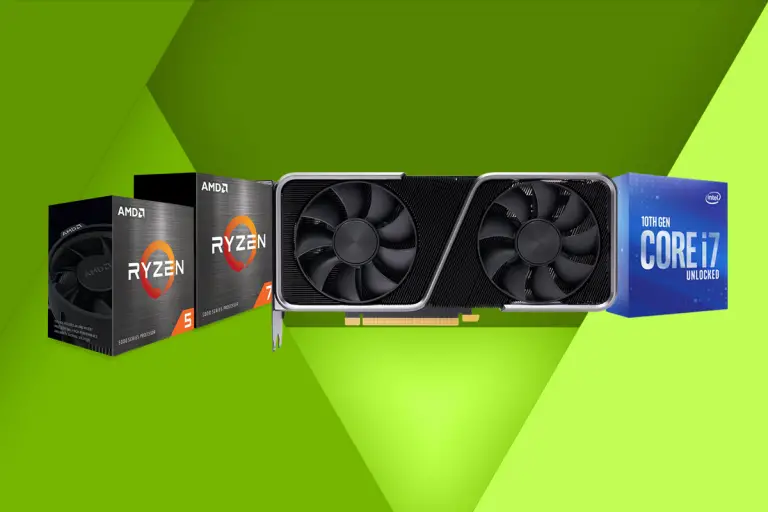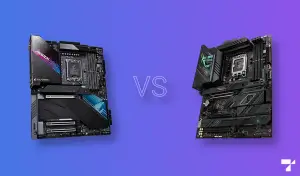The RTX 3000 Series Graphics Cards powered by Nvidia’s Ampere Architecture have proven to be a substantial step up in performance but not much in terms of value. But that may have changed with the RTX 3060 Ti. As a result, many want to build a PC around this GPU will want to pair it with an optimal CPU. Therefore, in this article, we have reviewed the best CPUs for RTX 3060 Ti.
The 3060 Ti is essentially an underpowered RTX 3070 that offers the same level of performance as the RTX 2080 Super, but at half the price. In other words, this new GPU makes the 2000 series almost obsolete.
With 8GB of GDDR6 VRAM, slightly over 4,800 CUDA cores, and a 1,67GHz boost frequency, the RTX 3060 Ti offers the most performance per dollar. The latest AAA games will work flawlessly at 1080p or 1440p. As for gaming at 4K resolutions, this GPU can handle it but you won’t reach 60 FPS in most cases. But all that depends on choosing the right CPU, so let’s start exploring 8 CPUs that pair well with the RTX 3060 Ti.
1. AMD Ryzen 5 5600X
Specifications:
Architecture: Zen 3 | Socket: AM4 | Cores/Threads: 6 / 12 | Base Frequency: 3.7GHz | Top Boost Frequency: 4.6GHz | TDP: 65WKey features:
- PCIe 4.0 for better graphics and storage bandwidth
- 7nm architecture
- 35MB total cache
- Wraith Prism Cooler with Razer Chroma support included
- AMD Ryzen Master Utility for simple overclocking
- AMD StoreMI technology
The Ryzen 5 5600X is one of the most popular mainstream processors and for a good reason. This CPU offers the most performance per dollar out of all the other Zen 3 CPUs. Despite having only 6 cores and a respectable 4.6GHz boost frequency, the 5600X is more than enough to power a gaming system together with the RTX 3060 Ti. Compared to its Zen 2 predecessor, it offers an additional 200MHz at lower power requirements thanks to the more advanced architecture.
If you’re primarily using your PC for gaming, the 5600X is enough even for 4K builds. Remember that the GPU is in charge of the graphics. All we care about is having a powerful enough CPU that doesn’t limit the GPU in any way. And the 5600X certainly doesn’t. Furthermore, it supports PCIe 4.0, which will reduce loading times and data transfer rates as more games and applications are developed with it in mind.
In essence, the Ryzen 5 5600X is a budget future-proof CPU that allows us to set up a solid system with the RTX 3060 Ti. However, if you plan on using your PC to work with professional software, you should look at something with a higher core/thread count.
2. AMD Ryzen 7 5800X
Specifications:
Architecture: Zen 3 | Socket: AM4 | Cores/Threads: 8 / 16 | Base Frequency: 3.8GHz | Top Boost Frequency: 4.7GHz | TDP: 105WKey features:
- PCIe 4.0 for better graphics and storage bandwidth
- 7nm architecture
- 36MB total cache
- AMD StoreMI technology
- AMD Ryzen Master Utility for simple overclocking
The Ryzen 7 5800X is the best choice for gamers that want some extra processing power without having to break the bank. This CPU finds itself in a sweet spot when it comes to the performance it offers. With 8 cores/16 threads and a 4,7GHz boost frequency, the 5800X is ideal for a 4K gaming system that occasionally needs to run demanding software as well. Applications benefit more from the higher thread count than games, so this CPU is the best choice for a jack of all trades sort of PC.
As for features, the 5800X is future-proof as it offers PCIe 4.0 support, so it will take years before you should upgrade it. AMD also brings several software improvements and utilities with the 5800X, as well as the entire Zen 3 line of processors. More notably, we have the StoreMI software that boosts storage performance by increasing the rate of data transfers. However, the motherboard has to support this feature as well.
All in all, the 5800X is for performance seekers who don’t want to spend a lot of money. It’s a mainstream CPU developed for consumers, just like the RTX 3060 Ti. You can’t go wrong by combining the two components.
3. AMD Ryzen 9 5900X
Specifications:
Architecture: Zen 3 | Socket: AM4 | Cores/Threads: 12 / 24 | Base Frequency: 3.7GHz | Top Boost Frequency: 4.8GHz | TDP: 105WKey features:
- PCIe 4.0 for better graphics and storage bandwidth
- 7nm architecture
- 70MB total cache
- AMD StoreMI technology
- AMD Ryzen Master Utility for simple overclocking
If mainstream doesn’t quite cut it, then you probably want a high-end processor. The Ryzen 9 5900X is a processing powerhouse, ideal for working with demanding software and for a top of the line gaming build. Having a large 70MB cache is particularly great for gaming performance and combined with the high 4.8GHz clock speed, we have an excellent processor that goes with the RTX 3060 Ti.
Thanks to the Zen 3 architecture, the 5900X requires less power than other CPUs within the same performance range. This factor allows us to be more flexible with our PSU choice and worry less about power draw, especially if planning to use the CPU at stock speeds.
As for features, the 5900 comes with AMD’s entire array of software upgrades and improvements. It supports PCIe 4.0, it comes with the StoreMI technology for improved storage use, and it supports overclocking straight from the user-friendly Ryzen Master Utility. The only real downside is that it doesn’t include the Wraith Prism cooler like the previous generation did.
In essence, the 5900X is one of the most versatile and fully-featured processors out there and it certainly won’t hold back the RTX 3060 Ti.
4. Intel i9-10900K
Specifications:
Architecture: Comet Lake-S | Socket: LGA 1200 | Cores/Threads: 10 / 20 | Base Frequency: 3.7GHz | Top Boost Frequency: 5.30GHz | TDP: 125WKey features:
- 10 cores in the affordable range
- Thermal Velocity Boost technology for high overclocking
- New overclocking controls
- Hyper-Threading technology
While AMD currently dominates the CPU market with the launch of the Zen 3 processors, Intel still has a few excellent processors that work well with the RTX 3060 Ti. The 10900K is one of them.
Despite using the older 14nm manufacturing process, Intel demonstrates they’re the masters of high clock speeds. This 10-core processor can reach an impressive 5.3GHz frequency thanks to Thermal Velocity Boost technology. This makes the 10900K one of the most powerful and versatile CPUs with a fairly budget-friendly price tag.
The downside is that the 10900K isn’t the best choice for a future-proof setup, mainly because it doesn’t support the PCIe 4.0 interface. However, Intel is behind AMD in this department when it comes to all of their processors currently available. If you want to invest in a CPU that will power your system for many years to come, you might want to wait for Intel’s next-gen line of processors.
5. AMD Ryzen 7 3700X
Specifications:
Architecture: Zen 2 | Socket: AM4 | Cores/Threads: 8 / 16 | Base Frequency: 3.6GHz | Top Boost Frequency: 4.40GHz | TDP: 65WKey features:
- PCIe 4.0 for better graphics and storage bandwidth
- 7nm technology
- 36MB total cache
- Wraith Prism Cooler with Razer Chroma support included
While the new line of Zen 3 processors take the spotlight, their Zen 2 predecessors remain a valid choice for an RTX 3060 Ti system. The Ryzen 7 3700X is a perfect example. Being the predecessor of the 5800X, this 8-core CPU can be boosted to a 4.4GHz frequency without having high power requirements. In many ways, it’s similar to the 5800X, but around $100 cheaper. This means it’s capable of powering a solid gaming PC together with the RTX 3060 Ti, but it can also be used for heavier operations like 4K video editing.
As for features, the 3700X offers PCIe 4.0 support despite being an older generation. Furthermore, it includes the Wraith Prism cooler, unlike most of the Zen 3 processors.
All in all, the 3700X is one of the best choices for those who are restricted by their budget but still want to get the most out of the RTX 3060 Ti.
6. Intel Core i7-10700K
Specifications:
Architecture: Comet Lake | Socket: LGA 1200 | Cores/Threads: 8 / 16 | Base Frequency: 3.8GHz | Top Boost Frequency: 5.10GHz | TDP: 125WKey features:
- Can be overclocked up to 5.1 GHz using Turbo Boost Max 3.0
- Hyper-Threading technology
- Easy to use overclocking controls
- Intel Optane Memory support
The i7-10700K is a powerful 8-core processor that can reach a boost frequency of 5.1GHz. We’re used to Intel’s impressive clock speeds, especially when even the base frequency is slightly higher than what we see in other CPUs. In fact, this i7 is close to the i9-9000K, but without the price tag. So if you’re looking for a powerful gaming processor, this 8-core i7 is a great option.
However, keep in mind that the 10700K doesn’t offer PCIe 4.0 supportas the RTX 3060 Ti does, and therefore that feature won’t be usable. This aspect may not affect us for a little white because most games don’t take advantage of it yet, but it’s something to think about if you plan on building a future-proof PC.
7. AMD Ryzen 5 3600X
Specifications:
Architecture: Zen 2 | Socket: AM4 | Cores/Threads: 6 / 12 | Base Frequency: 3.8GHz | Top Boost Frequency: 4.4GHz | TDP: 95WKey features:
- PCIe 4.0 for better graphics and storage bandwidth
- 7nm technology
- 35MB GameCache memory for boosted performance
- Wraith Prism Cooler with Razer Chroma support included
If all you need is a 1080p or 1440p gaming system, a 6-core CPU like the Ryzen 5 3600X is enough. This 6-core processor has a strong base frequency of 3.8GHz that can be boosted up to 4.4GHz. The boost frequency isn’t that impressive, but it’s more than enough for AAA games, especially when the RTX 3060 Ti does most of the work. Furthermore, the 3600X supports PCIe 4.0, so you’ll be able to take advantage of that feature since the 3060 Ti also supports it.
The 3600X remains a great budget-friendly option, however, the price difference between it and the newer 5600X is quite small. For around $50 more, you can opt for the 5600X, which is more powerful thanks to the more efficient Zen 3 architecture.
8. Intel Core i5-10600K
Specifications:
Architecture: Comet Lake | Socket: LGA 1200 | Cores/Threads: 6 / 12 | Base Frequency: 4.10GHz | Top Boost Frequency: 4.80Hz | TDP: 125WKey features:
- Turbo Boost 2.0
- Hyper-Threading technology
- New overclocking controls for more efficient tuning
- Intel Optane Memory support
The i5-10600K is a midrange 6-core processor with an impressive base frequency. Intel is famous for high clock speeds, so we shouldn’t be surprised there. Starting from 4.1 GHz with an overclocking potential of 4.8GHz, this processor is one of the best in its price category, especially for gaming. Remember that most games benefit from a strong single-core performance, which makes the i5 a great option in combination with the RTX 3060 Ti.
The only downside is that Intel is, in general, behind AMD when it comes to architecture and features. The 10600K isn’t future-proof because it supports only PCIe 3.0, so even though the RTX 3060 Ti supports PCIe 4.0, we won’t benefit from it.
The bottom line is, if you want to stick to Intel, you might want to wait for the next generation of CPUs that are just around the corner. But if you really need a processor right now and you’re on a budget, the 10600K is still a good choice for the next couple of years until you upgrade.
Final Thoughts
The RTX 3060 Ti is a powerful and versatile graphics card, and it can be paired with a variety of processors that won’t bottleneck its performance. It all depends on what you need the CPU for. If you plan on using your system for gaming, a 6-core processor, like the 5600X or 10600K is all you need. On the other hand, if you work with professional software as well, you should consider the 10900K or 5900X. Everything depends on what you’re going to do with the RTX 3060 Ti.



